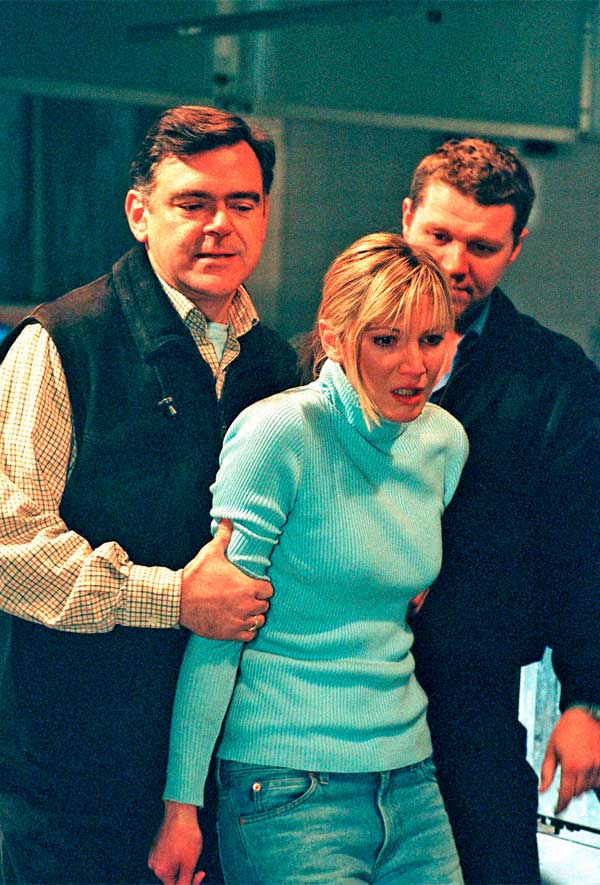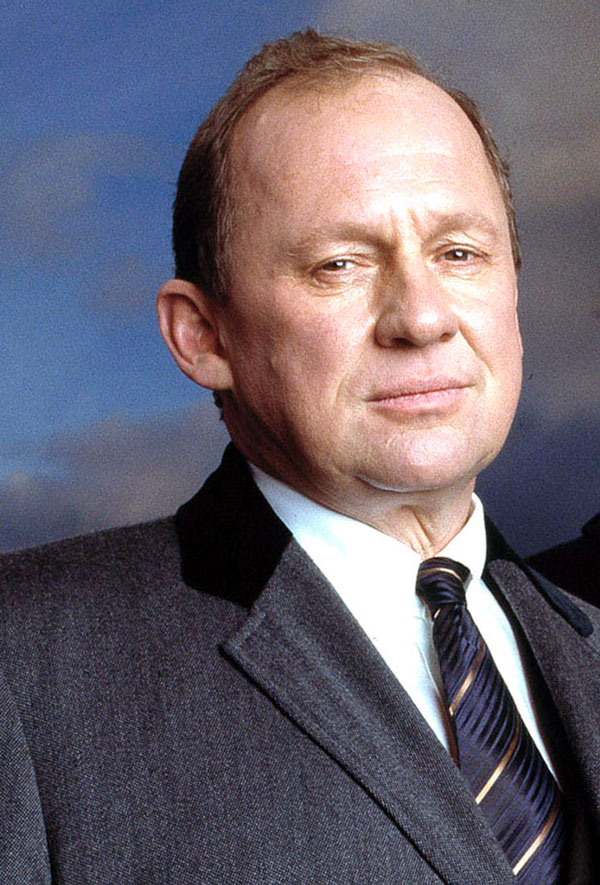Long before Game Of Thrones began offing its lead characters with gleeful abandon, Spooks was blazing a trail for on-screen terminations. Often with actual blazes. Huge, remotely detonated ones. Suddenly, for the first time on a major BBC drama, no-one was safe. Neither, in some controversial cases, were they quite who they seemed…
Featherstone: Before the final episode, I tallied the number of lead characters we’d killed off. I think it was 17.
Macfadyen: The deep-fat fryer was the thing that grabbed everyone. Killing off Lisa Faulkner was a really good dramatic move.

“People still ask if I’ve been put off deep-fat fryers. I’ll walk into a kitchen and people will say, ‘Whooah! Keep her away from the fryer.’”
Heggessey: We wanted to do something that would grab the audience by the scruff of the neck.
Faulkner: People still ask if I’ve been put off deep-fat fryers. I’ll walk into a kitchen and people will say, “Whooah! Keep her away from the fryer.”
Featherstone: David had written this great idea for the final episode of the first season – it was going to be episode 13 in the development phase – and I just said, “What’s the best story we’ve got?” and it was that one. “If we bring that story forward, won’t that scare the pants off everyone?” Lisa was probably our biggest name at that point. We used that history she had with the audience.
Faulkner: I remember my neighbour saying, “God, you must have been so gutted.” I asked why and they said, “Well, did you know that was going to happen?” I said, “Yeah! It wasn’t like I’d been a really naughty girl in the first episode and they decided to get rid of me.” I’ve had to explain it to people because they’re so funny about it.
Nalluri: We cast her because she was the nation’s sweetheart, and we built her up as the overt love interest in the office. Then they went off on their undercover thing and she got deep-fat fried. (Laughs)
Faulkner: The chip fat was a mixture of tea and oil, and dry ice to make it look hot.
Nalluri: There was a bloke with a very long straw blowing into it!
Macfadyen: I just remember being on the floor shouting a lot.
Faulkner: My hair and the side of my face were really oily and wet. I look back and think, “Oh yeah, we were in that funny kitchen and my hand went in and then I died!” My family weren’t that bothered. My dad was like, “Oh yeah, you’ll do something else.” He's much more impressed by my cooking.
Featherstone: The scene gave us confidence for the future deaths. It became defining for the series. All bets were off.
Faulkner: I was shooting something for the BBC last Friday and one of the cameramen came up to talk to me about it. I thought, “This is crazy!”
Featherstone: I loved David Oyelowo’s death where he has the gun to his head and tells the terrorist to fuck off. Ruth’s too.
Walker: David’s death was the point were I thought, “Okay, this is great telly.” I had someone grab my hand on the Northern Line and start sobbing. I said, “I know, I know… but what an amazing exit!”

“The actors would get the script and think, ‘Am I going to make it to the end or will I be out of work next week?’”
Firth: No-one had killed their heroes before and it was enormously powerful. Now it’s become standard practice.
Macfadyen: When Tom swims into the North Sea, I thought, “Well, that’s the end of him.” I’d only signed on for two seasons but I met Jane Featherstone and she sold me the idea of coming back for another couple of episodes.
Featherstone: Tom survived because he was the most resilient, clever, strong individual. (Laughs)
Macfadyen: We filmed that scene in Suffolk by a big nuclear power station and I had a bit of a hangover, so it was quite nice to get in the sea. How did Tom survive? I think he just used his genius spy-ness to hold his breath and float down the coastline. He was also in the swimming team at school and was first in his class at MI5 for holding his breath!
Firth: The actors would get the script and think, “Am I going to make it to the end or will I be out of work next week?” But Jane reassured me that they needed an anchorman, so I never thought Harry would die.
Penry-Jones: Adam’s death scene was incredible, like a bomb had gone off in the middle of London. The public were quite shocked when this huge mushroom cloud went up in the middle of Finsbury Square.
Featherstone: To do a massive explosion like that on a TV budget in the middle of town was pretty difficult.
Penry-Jones: I was watching from a safe distance!
Norris: I’ve never seen my death scene (Ros is killed by a bomb in season eight). I don’t know why, I just haven’t. I’d like to – maybe I will now! I put a lot into it.
Armitage: Fans didn’t like [the Lucas North/John Bateman twist]. They were very upset about that turnaround. I feel like they felt like the rug was being pulled out from under their feet. But I remember sitting down with (producer) Andrew Woodhead before we went into series nine and he said, “We’ve got this crazy idea for the character, what do you think?” and I said, “Yeah, do it!”